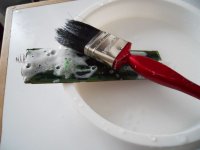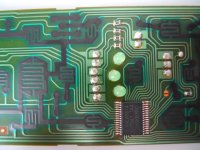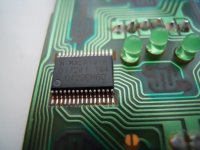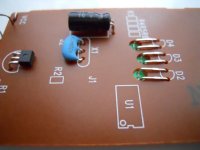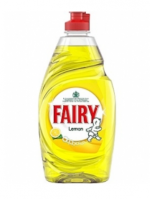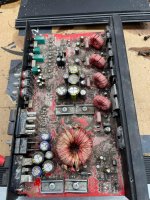Hello!
I'm soliciting your idea on how to clean the amplifier boards.
I'm thinking if I it is okay to dip the amplifier board in the water with soap and dry it for a couple of days. Do you think this should be fine? my apology if this is completely wrong...
Thank you!
I'm soliciting your idea on how to clean the amplifier boards.
I'm thinking if I it is okay to dip the amplifier board in the water with soap and dry it for a couple of days. Do you think this should be fine? my apology if this is completely wrong...
Thank you!
Last edited:
if I it is okay to dip the amplifier board in the water with soap and dry it for a couple of days.
I've seen this done (even in a dishwasher), but you should use liquid soap and rinse well several times.
Some components may not like the bath. Just using an old toothbrush can work wonders.
I've seen this done (even in a dishwasher), but you should use liquid soap and rinse well several times.
Some components may not like the bath. Just using an old toothbrush can work wonders.
thank you!
Last edited:
Are you talking about the bare PCB? Then it should be OK.
If you are talking about assembled board, it is not a good idea, water may cause damage depending on the type components that are on the board.
assembled boards with inductors and transformer...but exclusion of potentiometers and trimmer from a bath.
Used to do this all the time with TV's, remotes, VCR's etc. Yes, even the high voltage stuff.
Foam cleaner or washing up liquid, soft brush hot water and rinse well. Boards come up like new.
Do not wet any adjustable coils or trimmer caps which really means do not wash RF circuitry.
Dry thoroughly by dabbing with paper towel and then place on a hot radiator for several hours.
Foam cleaner or washing up liquid, soft brush hot water and rinse well. Boards come up like new.
Do not wet any adjustable coils or trimmer caps which really means do not wash RF circuitry.
Dry thoroughly by dabbing with paper towel and then place on a hot radiator for several hours.
Use electronics cleaner. It doesn't leave residues.
A quick way to check if residues are left, is put some of your cleaning solution on a white paper, and let the paper dry. Inspect the paper under a strong light. If it is discolored where it was wet, do not use the cleaning solution for electronics.
Johan-Kr
A quick way to check if residues are left, is put some of your cleaning solution on a white paper, and let the paper dry. Inspect the paper under a strong light. If it is discolored where it was wet, do not use the cleaning solution for electronics.
Johan-Kr
Either I'm too picky or got some junk "electrical","electronics"cleaners,but I don't like the type of "finish" they leave.Its like a residue,don't have a better name for it.But visible to some extent.
I was skeptical at first but literally just water and a toothbrush in the sink is awesome especially when you do it for the first time and see how it looks.
Just be patient with blow nozzle on an air compressor (generally regulated somewhat down from the 125-175 that most compressors cycle off at with a pencil blow gun)or keyboard duster etc,be creative,and a just a touch of common sense.
Just dry immediately after washing and dry well.Like under caps,when you think you've dried it.Go over it twice more.Ive had literally zero issues with that generic philosophy.
I have pretty clean city water in general, surprisingly, plus a softener.Dont know if that means anything but water marks and general deposits are nonexistent even if I drip dry.
But I always blow them out several times and even set on the front porch is some sunlight for an aid in drying in the summer because I can.Not needed tho if you take your time.
If your really nervous about moisture that's in compressed air and co2(keyboard duster) even tho duster co2 may be more "refined" than soda fountain co2,it may still have some sort of moisture content.
You could go over the top and use say nitrogen or helium if your truly concerned��
Sorry for the excessive bs on board washing.Got bored apparently ��
I was skeptical at first but literally just water and a toothbrush in the sink is awesome especially when you do it for the first time and see how it looks.
Just be patient with blow nozzle on an air compressor (generally regulated somewhat down from the 125-175 that most compressors cycle off at with a pencil blow gun)or keyboard duster etc,be creative,and a just a touch of common sense.
Just dry immediately after washing and dry well.Like under caps,when you think you've dried it.Go over it twice more.Ive had literally zero issues with that generic philosophy.
I have pretty clean city water in general, surprisingly, plus a softener.Dont know if that means anything but water marks and general deposits are nonexistent even if I drip dry.
But I always blow them out several times and even set on the front porch is some sunlight for an aid in drying in the summer because I can.Not needed tho if you take your time.
If your really nervous about moisture that's in compressed air and co2(keyboard duster) even tho duster co2 may be more "refined" than soda fountain co2,it may still have some sort of moisture content.
You could go over the top and use say nitrogen or helium if your truly concerned��
Sorry for the excessive bs on board washing.Got bored apparently ��
I actually had cause to wash a PCB today, OK so it was only a remote control but it was a good example.
Having rinsed the PCB I added a few drops of ordinary washing up liquid poured neat onto the PCB. Soft brush to clean both sides, rinse, shake, pat dry with a paper towel and dry on a radiator.
Having rinsed the PCB I added a few drops of ordinary washing up liquid poured neat onto the PCB. Soft brush to clean both sides, rinse, shake, pat dry with a paper towel and dry on a radiator.
Attachments
Obviously it looks practically mint.Now I'm curious.What is washing up liquid?And you say radiator?You have electric house heat or warming up the old dodge and using that radiator? Lol just being funny.
I'm assuming where your from you have different names for things.Is that common dish soap?And you air dry.All that matters is doing what's comfortable and knowing is works.
But if you don't mind giving some specifics I'd appreciate it so I can understand.
Lastly,I don't think I've cared enough nor has someone ever asked me to look at a remote control for anything.Obsolete control?Or you fix it for fun/challenge?
Thanks,Jon
I'm assuming where your from you have different names for things.Is that common dish soap?And you air dry.All that matters is doing what's comfortable and knowing is works.
But if you don't mind giving some specifics I'd appreciate it so I can understand.
Lastly,I don't think I've cared enough nor has someone ever asked me to look at a remote control for anything.Obsolete control?Or you fix it for fun/challenge?
Thanks,Jon
Yes, just ordinary dish washing liquid, and placed on top of an electric storage heater to dry.
Even the best cared for remotes can have a problem with the flexible neoprene keypad leaching a gooey sticky substance onto the PCB (plasticiser of some sort used in the manufacturing process). Some remotes are immune, for others it was an issue.
(and as a service tech I've washed off much worse than that from both remotes and large PCB's)
Even the best cared for remotes can have a problem with the flexible neoprene keypad leaching a gooey sticky substance onto the PCB (plasticiser of some sort used in the manufacturing process). Some remotes are immune, for others it was an issue.
(and as a service tech I've washed off much worse than that from both remotes and large PCB's)
Attachments
Ok gotcha.
I have a couple boards I planned on doing today.Ill try dish soap and check it out.Plus the amp is ~20years old and borderline filthy so that'll be a good example.Maybe I'll dry it in a dehumidifier?Best of both worlds?
Kidding,don't want someone to take me serious and think it's more complex than a flux capacitor.
Good talking,talk to ya later
I have a couple boards I planned on doing today.Ill try dish soap and check it out.Plus the amp is ~20years old and borderline filthy so that'll be a good example.Maybe I'll dry it in a dehumidifier?Best of both worlds?
Kidding,don't want someone to take me serious and think it's more complex than a flux capacitor.
Good talking,talk to ya later
You can cover the pots and switches with masking tape if you want to keep them relatively dry.
Saturate the board with whatever household cleaner you have. Let it soak a few minutes.
I use a pressure washer on low pressure (trigger not pulled) unless there is something really stubborn on the board.
After washing, use compressed air (oil-less compressor or canned air) to force as much water from under components as possible. For large open potentiometers, don't force compressed air in the holes. It can damage the wipers.
Set in sun to dry if you don't live in an are where it's likely to get stolen. If that's not possible, setting it in front of a fan in an area with heating/air conditioning will help it dry.
Saturate the board with whatever household cleaner you have. Let it soak a few minutes.
I use a pressure washer on low pressure (trigger not pulled) unless there is something really stubborn on the board.
After washing, use compressed air (oil-less compressor or canned air) to force as much water from under components as possible. For large open potentiometers, don't force compressed air in the holes. It can damage the wipers.
Set in sun to dry if you don't live in an are where it's likely to get stolen. If that's not possible, setting it in front of a fan in an area with heating/air conditioning will help it dry.
What about potentiometers?
I just soldered my first 2 pcb‘s—the ACA—I now would like to install them shiny.
But I 'm concerned about the potentiometers (These tiny blue pots, to be adjusted with a screwdriver—should I remove them before cleaning/rinsing the pcb?
Thank you!
da
I actually had cause to wash a PCB today, OK so it was only a remote control but it was a good example.
Having rinsed the PCB I added a few drops of ordinary washing up liquid poured neat onto the PCB. Soft brush to clean both sides, rinse, shake, pat dry with a paper towel and dry on a radiator.
I just soldered my first 2 pcb‘s—the ACA—I now would like to install them shiny.
But I 'm concerned about the potentiometers (These tiny blue pots, to be adjusted with a screwdriver—should I remove them before cleaning/rinsing the pcb?
Thank you!
da
Last edited:
Hello,You should be fine as long as you quickly rinse around the pots with warm water and then use paper towel to soak up any moisture from under the pot.
It is very important that everything is dry before applying power so as to prevent electrolysis occurring.
One more thing you could do to make sure the water and soap does no harm. Do a final rinse of the board with distilled water. And give it plenty of time to dry before using.
Someone sent me this photo just tonight. Died by mud flooding. When they come in like this it’s simple green/water to the rescue or straight to the parts bins. After water I use a hair drier and a fan. They come out pretty clean.
Attachments
- Home
- General Interest
- Car Audio
- Washing an amplifier board
